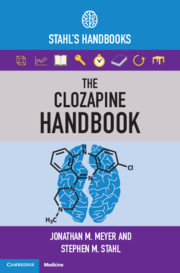Book contents
- The Clozapine Handbook
- The Clozapine Handbook
- Copyright page
- Additional material
- Contents
- Foreword
- Introduction
- 1 The Efficacy Story: Treatment-Resistant Schizophrenia, Psychogenic Polydipsia, Treatment-Intolerant Schizophrenia, Suicidality, Violence, Mania and Parkinson’s Disease Psychosis
- 2 Addressing Clozapine Positive Symptom Nonresponse in Schizophrenia Spectrum Patients
- 3 Initiating Clozapine
- 4 Discontinuing Clozapine and Management of Cholinergic Rebound
- 5 Binding Profile, Metabolism, Kinetics, Drug Interactions and Use of Plasma Levels
- 6 Understanding Hematologic Monitoring and Benign Ethnic Neutropenia
- 7 Managing Constipation
- 8 Managing Sedation, Orthostasis and Tachycardia
- 9 Managing Sialorrhea
- 10 Managing Seizure Risk and Stuttering
- 11 Managing Metabolic Adverse Effects
- 12 Fever, Myocarditis, Interstitial Nephritis, DRESS, Serositis and Cardiomyopathy
- 13 Managing Enuresis and Incontinence, Priapism, Venous Thromboembolism, Neuroleptic Malignant Syndrome, Tardive Dyskinesia and Obsessive Compulsive Disorder
- 14 Eosinophilia, Leukocytosis, Thrombocytopenia, Thrombocytosis, Anemia, Hepatic Function Abnormalities
- 15 Special Topics: Child and Adolescent Patients, Elderly Patients, Patients With Intellectual Disability, Pregnancy and Risk for Major Congenital Malformation, Lactation, Overdose, Postmortem Redistribution
- Index
- References
7 - Managing Constipation
Published online by Cambridge University Press: 19 October 2021
- The Clozapine Handbook
- The Clozapine Handbook
- Copyright page
- Additional material
- Contents
- Foreword
- Introduction
- 1 The Efficacy Story: Treatment-Resistant Schizophrenia, Psychogenic Polydipsia, Treatment-Intolerant Schizophrenia, Suicidality, Violence, Mania and Parkinson’s Disease Psychosis
- 2 Addressing Clozapine Positive Symptom Nonresponse in Schizophrenia Spectrum Patients
- 3 Initiating Clozapine
- 4 Discontinuing Clozapine and Management of Cholinergic Rebound
- 5 Binding Profile, Metabolism, Kinetics, Drug Interactions and Use of Plasma Levels
- 6 Understanding Hematologic Monitoring and Benign Ethnic Neutropenia
- 7 Managing Constipation
- 8 Managing Sedation, Orthostasis and Tachycardia
- 9 Managing Sialorrhea
- 10 Managing Seizure Risk and Stuttering
- 11 Managing Metabolic Adverse Effects
- 12 Fever, Myocarditis, Interstitial Nephritis, DRESS, Serositis and Cardiomyopathy
- 13 Managing Enuresis and Incontinence, Priapism, Venous Thromboembolism, Neuroleptic Malignant Syndrome, Tardive Dyskinesia and Obsessive Compulsive Disorder
- 14 Eosinophilia, Leukocytosis, Thrombocytopenia, Thrombocytosis, Anemia, Hepatic Function Abnormalities
- 15 Special Topics: Child and Adolescent Patients, Elderly Patients, Patients With Intellectual Disability, Pregnancy and Risk for Major Congenital Malformation, Lactation, Overdose, Postmortem Redistribution
- Index
- References
Summary
Constipation is a common problem in western societies, but gastrointestinal hypomotility (GIH) assumes greater significance during clozapine therapy for several reasons: GIH is highly prevalent; GIH accounts for 36% of all medically related causes of treatment discontinuation; and in its most severe form, paralytic ileus, there is a fatality rate of 15.0–27.5%. Gastrointestinal illness accounted for 20% of all medically related hospital admissions for clozapine-treated patients at one major US medical center, of which 61% were for hypomotility-related problems. The magnitude of clozapine’s effect on motility is dramatic: the median colonic transit time (CTT) in one study was 23 hours among inpatients on nonclozapine antipsychotics, compared to 104 hours for those on clozapine. Moreover, 80% of the clozapine-treated patients had evidence of GIH, and transit times in all colonic segments were abnormal. Importantly, clozapine-associated GIH occurred irrespective of gender, age, ethnicity, or length of clozapine treatment. Only plasma clozapine level correlated with GIH severity as measured by transit time.
- Type
- Chapter
- Information
- The Clozapine HandbookStahl's Handbooks, pp. 140 - 157Publisher: Cambridge University PressPrint publication year: 2019



